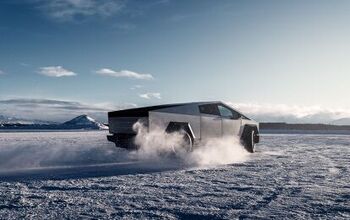Wild-Ass Rumor Of The Day: VW and Mercedes Oppose CAFE Because Their Arab Masters Tell Them To
Today’s wild-ass rumor of the day really lives up to its wild-ass billing, combining equal parts conspiracy theory and ressentiment for a high-proof cocktail of crazy. In a blog (i.e. not very well thought-through) item at Automotive News [sub], Industry Editor James Treece primes the loco pump with an intriguing proposition:
Some commentators and bloggers assume that ownership explains what goes on in the auto industry. They argue that GM and Chrysler management have repeatedly bowed to the desires of their government and union owners over the last two years, and that government ownership has perverted the market in other ways as well.
Well, if that’s so, it’s fair to ask the same question about the latest fuel-economy rules — and the companies that oppose them.
Already the crazy is starting to show: the Detroit automakers are widely recognized to be the chief beneficiaries of the “compromise” modifications to Obama’s proposal. So if government-owned automakers didn’t actually roll over for regulators, why legitimize the crackpot theories of “some commentators and bloggers”? Because Treece has a crackpot theory of his own…
Treece notes that Volkswagen and Daimler were the most prominent dissenters from the CAFE “compromise,” and completely glossing over their reasons for doing so, he asks readers to “consider who owns them.”
The Emirate of Abu Dhabi, through Aabar Investments, owns 9 percent of Daimler.
Qatar owns 17 percent of the voting rights at Volkswagen.
If you claim GM’s management only supports the new CAFÉ numbers because its owners, one of whom is the U.S. government, tell it to, then answer me this:
Who’s telling Daimler and VW to oppose higher CAFÉ targets? And why might two companies with ties to oil-exporting powers have a problem with the United States taking steps to trim its oil imports?
Really? I mean, really? Is the Industry Editor of the biggest auto trade publication in the US really suggesting that two firms are breaking ranks with the rest of the industry because of the short-term interests of two tiny minority stakeholders? I mean how did that scenario play out? “Look Herr Winterkorn, I know the US is a fairly important market for you, but would you kindly oppose CAFE on the grounds that the ‘compromise’ is too easy on trucks? I know it’s a confusing move PR-wise, but Qatar really needs to catch a break on this fuel economy thing.” Does Treece even realize that neither Daimler nor VW are in a position to stop CAFE? If so, he either thinks the Qataris are too stupid to know that, or his readers are. Or, as his conclusion implies, this is all some kind of pedagogical exercise…
Hmmm…
If we’re going to raise suspicions about impartiality, let’s be sure to look under everyone’s bed.
So, Treece doesn’t actually think Abu Dhabi and Qatar are using German companies (in which they hold small stakes) to oppose American political decisions… he’s more frustrated with people who think government ownership has or had any kind of effect on GM or Chrysler. And if a few dumb readers do take his piece seriously, well, maybe it will go “viral” and take on a life of its own on the internet. After all, it reinforces some quality assumptions, including:
1) 2017-2025 CAFE standards are strong enough to scare the Arab oil barons.
2) We shouldn’t be interested in VW and Daimler’s stated reasons for opposing CAFE.
3) The bailed-out automakers didn’t “water down” CAFE.
4) We shouldn’t care if or how the government stake in GM/Chrysler affected CAFE negotiations.
I, for one, wouldn’t take any of those assumptions for granted… and I’d file this piece in the circular file if someone submitted it to TTAC.
More by Edward Niedermeyer
Latest Car Reviews
Read moreLatest Product Reviews
Read moreRecent Comments
- Bd2 If I were going to spend $ on a ticking time bomb, it wouldn't be for an LR4 (the least interesting of Land Rovers).
- Spectator Wild to me the US sent like $100B overseas for other peoples wars while we clammer over .1% of that money being used to promote EVs in our country.
- Spectator got a pic of that 27 inch screen? That sounds massive!
- MaintenanceCosts "And with ANY car, always budget for maintenance."The question is whether you have to budget a thousand bucks (or euro) a year, or a quarter of your income.
- FreedMike The NASCAR race was a dandy. That finish…

































Comments
Join the conversation
If Peugeot were in the US market, I would expect them to be in the VW and Daimler camp. They're not big into trucks, but they are big into diesels. Trucks get preferential treatment under the new proposal, and diesel does not. I'll save my tinfoil hat for REAL problems, like the whole paper/plastic/reusable grocery bag mess.
Daft analysis. As a longtime AN subscriber, I expect better.